
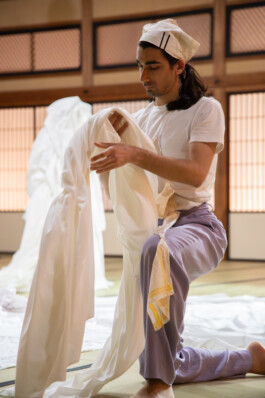
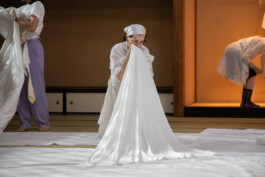
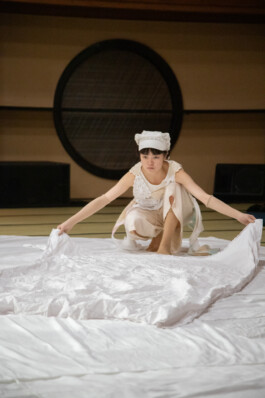
"During the blue nights you think the end of day will never come. As the blue nights draw to a close (and they will, and they do) you experience an actual chill, an apprehension of illness, at the moment you first notice: the blue light is going, the days are already shortening, the summer is gone.”
Blue Nights, Joan Didion


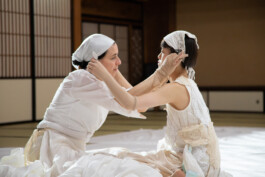
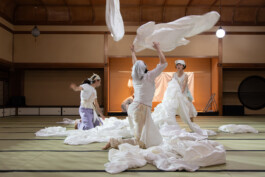
When one experiences loss, how does one enter grief? What rituals are needed to find a way into mourning? Which community holds one when feeling all alone? What routines and which gestures provide steadiness when everything else seems out of place? What textures and smells bring comfort? And when does grieving become work?
The performance MORNING TIME by Belle Santos and Emi Ogura explores these questions in a time when grieving seems difficult to access but is so often needed. Losing a close person disrupts everything and society invents rituals to bridge the void left behind. But what happens when these rituals are over? And what about erosions one experiences that don't find an echo in society? Drifting apart from a once-close friend, deciding to abort a pregnancy, living through a pandemic, or finding oneself displaced from work, no longer needed in a system that once seemed secure. When silences grow heavier, and the body carries an absence, a space and a time is needed in which one can simply be with what remains. In ancient times, professional mourners were thus called. Their work helped the bereaved to enter their state of grief.
In MORNING TIME, the great tatami room of the Kyoto Art Center is being filled with simple white sheets. The sheets don't want to be anything specific, they are everything, a canvas on which one can project. Every task that is executed happens in relation to these sheets. The room itself develops its own system of rules-rules of care, rules of presence, and rules of labor. With the help of the four performers the sheets provide the working material for a new interpretation of professional mourners. Working oneself through piles of sheets can seem like a never ending cycle, the work of a Sysyphus, who must learn to breathe through the discomfort. It is then, in the precision of the gestures, in the stillness and in the outbursts, that one learns to live with the loss, to continue not despite, but with the pain.
The soundscape moves between the mechanical and the intimate, drawn from the circulation of air, the flowing of water, the flickering of light. Low frequencies and ASMR-triggers unfold into a lullaby while drones and glitches disorient the routines of labour. When does one take time to grief?
The morning after can seem like an impossible task to perform. In Morning Time it is in the rhythm of the folding and the unfolding in which the work of grief takes shape. The morning does not erase the night, nor does it promise certainty, but it allows for a return-to the sheets, to the work, to the grief.
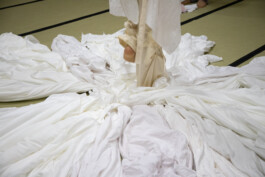

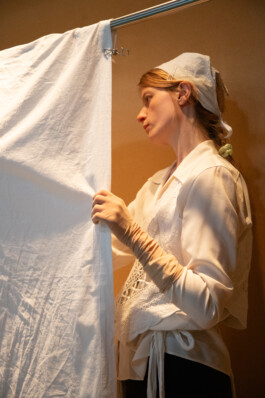
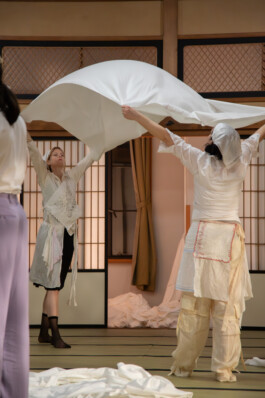
Team
CONCEPT AND DIRECTION Belle Santos CHOREOGRAPHY Emi Ogura SOUND DESIGN Nozomu Matsumoto PERFORMANCE Susanne Sachsse Mervan Ürkmez Emi Ogura Belle Santos DRAMATURGY Rahel Spöhrer, Bendix Fesefeldt PRODUCTION MANAGMENT Wiebke Wesselmann VIDEO Adam Kaplan LIGHTING DESIGN Yohei Sogo STAGE MANAGEMENT Yuhi Koyobashi TRANSLATION Momoko Watanabe DOCUMENTATION Yoshiro Inada PHOTOGRAPHY Tomoko Hayashi PROCUDED BY Co-program 2024 of the Kyoto Art Center, International Project Grant of the Saison Foundation Tokyo, International Co-Production Fund of the Goethe Institut and with the kind support of the Goethe Institut Villa Kamogawa, Kyoto, Theater Haus Mitte, Berlin and Morishita Studios, Tokyo.
"During the blue nights you think the end of day will never come. As the blue nights draw to a close (and they will, and they do) you experience an actual chill, an apprehension of illness, at the moment you first notice: the blue light is going, the days are already shortening, the summer is gone.”
Blue Nights, Joan Didion




When one experiences loss, how does one enter grief? What rituals are needed to find a way into mourning? Which community holds one when feeling all alone? What routines and which gestures provide steadiness when everything else seems out of place? What textures and smells bring comfort? And when does grieving become work?
The performance MORNING TIME by Belle Santos and Emi Ogura explores these questions in a time when grieving seems difficult to access but is so often needed. Losing a close person disrupts everything and society invents rituals to bridge the void left behind. But what happens when these rituals are over? And what about erosions one experiences that don't find an echo in society? Drifting apart from a once-close friend, deciding to abort a pregnancy, living through a pandemic, or finding oneself displaced from work, no longer needed in a system that once seemed secure. When silences grow heavier, and the body carries an absence, a space and a time is needed in which one can simply be with what remains. In ancient times, professional mourners were thus called. Their work helped the bereaved to enter their state of grief.
In MORNING TIME, the great tatami room of the Kyoto Art Center is being filled with simple white sheets. The sheets don't want to be anything specific, they are everything, a canvas on which one can project. Every task that is executed happens in relation to these sheets. The room itself develops its own system of rules-rules of care, rules of presence, and rules of labor. With the help of the four performers the sheets provide the working material for a new interpretation of professional mourners. Working oneself through piles of sheets can seem like a never ending cycle, the work of a Sysyphus, who must learn to breathe through the discomfort. It is then, in the precision of the gestures, in the stillness and in the outbursts, that one learns to live with the loss, to continue not despite, but with the pain.
The soundscape moves between the mechanical and the intimate, drawn from the circulation of air, the flowing of water, the flickering of light. Low frequencies and ASMR-triggers unfold into a lullaby while drones and glitches disorient the routines of labour. When does one take time to grief?
The morning after can seem like an impossible task to perform. In Morning Time it is in the rhythm of the folding and the unfolding in which the work of grief takes shape. The morning does not erase the night, nor does it promise certainty, but it allows for a return-to the sheets, to the work, to the grief.




Team
CONCEPT AND DIRECTION Belle Santos CHOREOGRAPHY Emi Ogura SOUND DESIGN Nozomu Matsumoto PERFORMANCE Susanne Sachsse Mervan Ürkmez Emi Ogura Belle Santos DRAMATURGY Rahel Spöhrer, Bendix Fesefeldt PRODUCTION MANAGMENT Wiebke Wesselmann VIDEO Adam Kaplan LIGHTING DESIGN Yohei Sogo STAGE MANAGEMENT Yuhi Koyobashi TRANSLATION Momoko Watanabe DOCUMENTATION Yoshiro Inada PHOTOGRAPHY Tomoko Hayashi PROCUDED BY Co-program 2024 of the Kyoto Art Center, International Project Grant of the Saison Foundation Tokyo, International Co-Production Fund of the Goethe Institut and with the kind support of the Goethe Institut Villa Kamogawa, Kyoto, Theater Haus Mitte, Berlin and Morishita Studios, Tokyo.